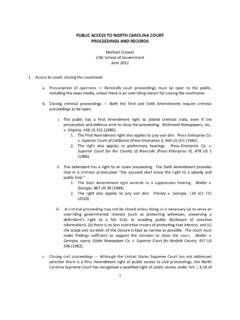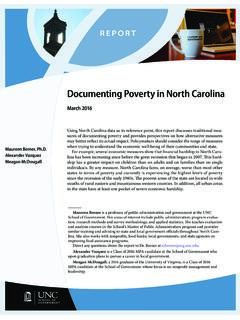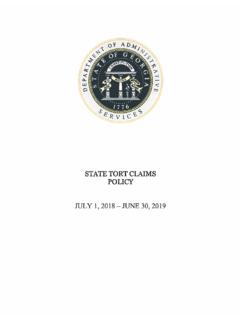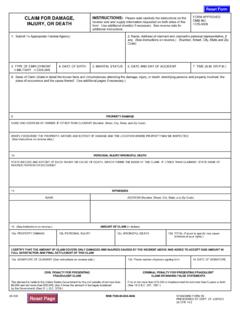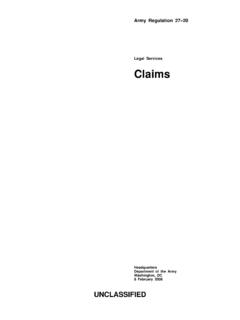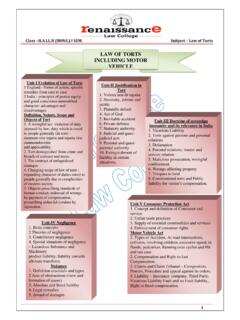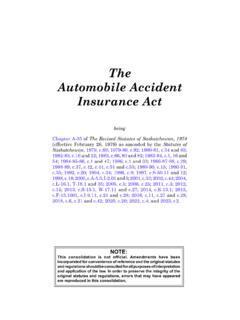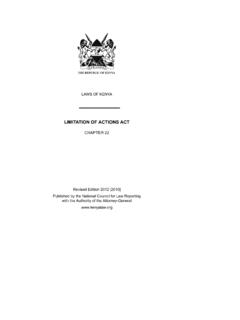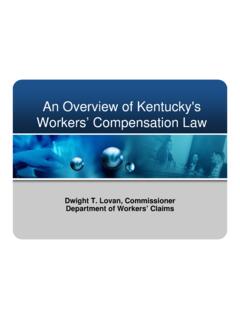Transcription of IMMUNITY OF THE STATE AND LOCAL GOVERNMENTS …
1 1 IMMUNITY OF THE STATE AND LOCAL GOVERNMENTS FROM LAWSUITS IN NORTH CAROLINA Trey Allen UNC School of Government June 2013 This paper summarizes IMMUNITY doctrines that protect the STATE and LOCAL GOVERNMENTS from lawsuits, with a particular focus on IMMUNITY for LOCAL GOVERNMENTS . It also briefly describes some of the immunities that can shield public officials or personnel from legal claims made directly against them. Sovereign IMMUNITY v. governmental IMMUNITY Sovereign IMMUNITY is the STATE s IMMUNITY from most kinds of lawsuits unless the STATE consents to be sued. Governmental IMMUNITY is generally understood to be that portion of the STATE s sovereign IMMUNITY which extends to LOCAL GOVERNMENTS . Both sovereign and governmental IMMUNITY derive from the English concept that the king can do no wrong.
2 See Estate of Williams v. Pasquotank County Parks & Recreation Dep t, ____ ____, 732 137 (2012); Abbot v. North Carolina Bd. of Nursing, 177 App. 45 (2006). Claims not barred by sovereign or governmental IMMUNITY Contract claims Neither the STATE nor a LOCAL government is immune from a claim for breach of a valid contract; by entering such a contract a governmental body waives IMMUNITY and consents to be sued for damages for breach of its contractual obligations. STATE v. Smith, 289 303 (1976). If a contract turns out to be invalid, IMMUNITY may prohibit the injured party from recovering damages for the governmental body s alleged failure to honor the contract. Thus, governmental IMMUNITY barred a plaintiff from recovering for unpaid work on a fire truck because the plaintiff s agreement with the defendant municipality did not include the preaudit certification required for a valid contract under 159 28.
3 M Series Rebuild, LLC, v. Town of Mount Pleasant, ____ App. ____, 730 254 (2012). Claims for violations of the North Carolina Constitution A plaintiff may not proceed with a claim directly under the NC Constitution when an adequate alternative remedy is available. Corum v. University of North Carolina, 330 761 (1992). For example, the availability of a tort claim for false imprisonment prevented a plaintiff from pursuing a claim that she was wrongfully imprisoned in violation of the STATE constitution. Davis v. Town of Southern Pines, 116 App. 663 (1994). An alternative remedy is not adequate if barred by sovereign or governmental IMMUNITY . Thus, the theoretical existence of a common law negligence action did not 2 preclude STATE constitutional claims against a LOCAL school board when governmental IMMUNITY blocked the plaintiff s negligence claim .
4 Craig ex rel. Craig v. New Hanover County Bd. of Educ., 363 334 (2009). Claims arising under federal law Given the complexity of the topic, a few points will have to suffice regarding lawsuits under 42 USC 1983 for deprivation of federal rights. Although the 11th Amendment to the United States Constitution generally bars federal lawsuits against the states, LOCAL GOVERNMENTS are not considered an arm of the STATE and are therefore not entitled to IMMUNITY from 1983 actions. Monell v. New York City Dep t of Soc. Servs., 436 658 (1978). LOCAL GOVERNMENTS may be sued for federal constitutional violations attributable to their official policies or customs. Individual LOCAL government officers and employees also may be sued under 1983.
5 Legislative or judicial IMMUNITY discussed below may shield public officials sued individually from liability for legislative, judicial, or quasi judicial acts. Other public officials may have a qualified IMMUNITY /good faith defense, which means they are subject to payment of monetary damages only if they knew or should have known that their acts were unlawful. Sovereign IMMUNITY for tort claims against the STATE The STATE has waived its IMMUNITY against tort claims to the extent provided by the NC tort Claims Act ( TCA or Act ). The Industrial Commission has exclusive, original jurisdiction over claims covered by the TCA. See Guthrie v. North Carolina Ports Auth., 307 522 (1983). Nonetheless, the STATE may be brought into a tort action in superior or district court as a third party or third party defendant pursuant to Rule 14(c) of the NC Rules of Civil Procedure.
6 The TCA permits recovery for injuries caused by the negligence of STATE officers, employees, or agents acting within the scope of their duties under circumstances that would subject the STATE to liability if it were a private individual. 143 291(a). The Act does not waive the STATE s IMMUNITY from tort claims arising from the intentional misconduct of STATE employees. General tort principles apply to claims under the TCA. For example, contributory negligence is a complete bar to recovery. See 143 291(a). The Act places a limit of $1,000,000 on the amount the STATE may be required to pay for harm to an individual resulting from a single incident. 143 This monetary cap applies both in the Industrial Commission and when the STATE is brought in as a third party or third party defendant to a tort action in superior or district court.
7 The STATE has waived sovereign IMMUNITY by statute in other contexts. Section 97 7 of the General Statutes, for instance, subjects the STATE and its political subdivisions to workers compensation claims. 3 Governmental IMMUNITY for tort claims against LOCAL GOVERNMENTS Governmental IMMUNITY bars tort claims against LOCAL GOVERNMENTS for injuries caused by their employees or agents acting within the scope of their duties in the performance of governmental functions. It does not protect a LOCAL government from tort claims arising from the performance of proprietary functions. Much of the case law involving governmental IMMUNITY focuses on whether (1) the employee who caused the injury was acting within the scope of the employee s duties and (2) whether the activity in which the employee was engaged was governmental or proprietary.
8 Scope of employment LOCAL GOVERNMENTS are not liable for the torts of employees acting beyond the scope of their duties. Accordingly, if an employee exceeded the scope of the employee s duties in causing a plaintiff s injury, there is no need to analyze whether the activity was governmental or proprietary. An employee s duties include those formally prescribed, as well as the employee s actual or customary duties. Even when an employer did not expressly authorize the specific act in question, courts will usually find that an employee acted within the scope of the employee s duties if the action furthered the employer s business. Put differently, employees do not act within the scope of their duties when they act for wholly personal reasons.
9 For example, a town employee exceeded the scope of his duties when he took a town vehicle on a pleasure trip that resulted in the death of one of his passengers. Rogers v. Town of Black Mountain, 224 119 (1944). Although employers are typically not liable for the intentional misconduct of their employees, it is possible for an employee to commit an intentional tort within the scope of the employee s duties. Thus, it was for a jury to decide whether a sanitation worker was acting in furtherance of the city s business when he assaulted the plaintiff at her residence after she asked him to pick up additional garbage. Edwards v. Akion, 52 App. 688 (1981). Similarly, the manager of a municipal water company acted in furtherance of the city s business when he repeatedly struck a patron who paid a portion of his water bill in pennies.
10 Munick v. City of Durham, 181 188 (1921). Governmental v. proprietary functions Assuming the employee who inflicted a plaintiff s injuries acted within the scope of the employee s duties, the LOCAL government is liable for the plaintiff s injuries if the activity in which its employee was engaged was a proprietary function. If the activity was a governmental function, governmental IMMUNITY will bar the plaintiff s tort claim unless the LOCAL government has waived its IMMUNITY from suit as described below. Steelman v. City of New Bern, 279 589 (1971). 4 Determining whether an activity is a governmental or proprietary function is difficult, and the court decisions are not always consistent. See, , Sides v. Cabarrus Mem l Hosp.


